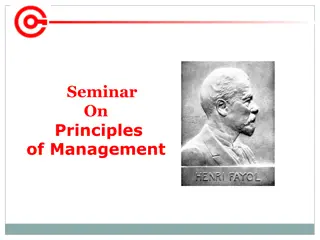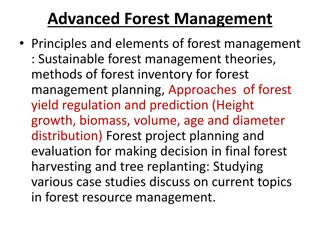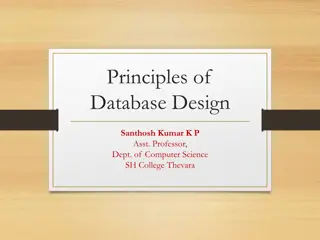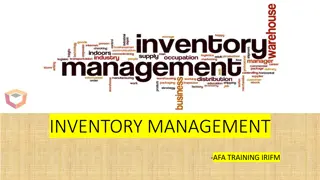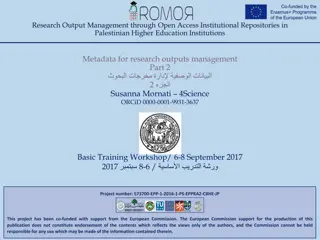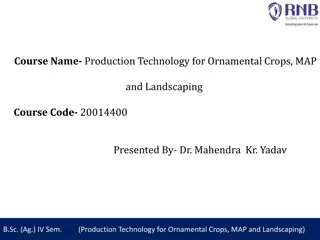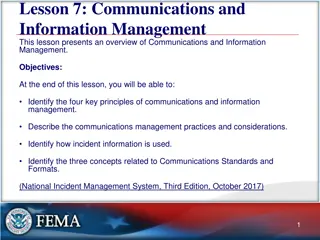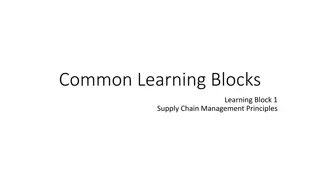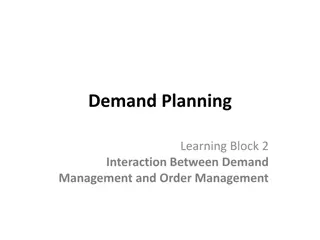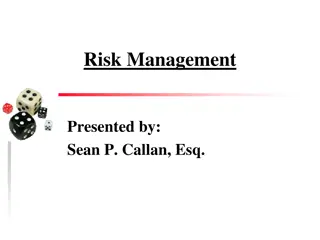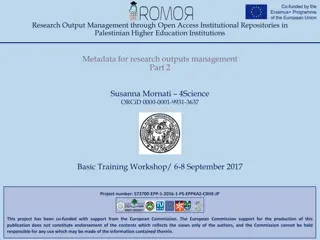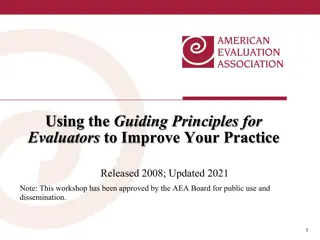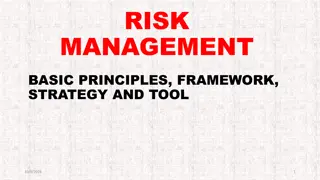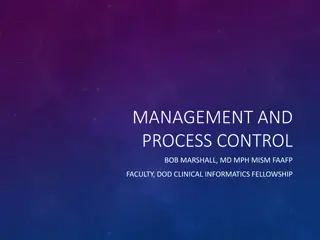Principles of the Ghana Civil Service Code of Conduct
The Code of Conduct for the Ghana Civil Service, outlined by Elizabeth Obeng-Yeboah, emphasizes principles such as abiding by the constitution and laws with dignity, integrity, and professionalism. It sets standards for conduct, avoiding conflicts of interest, maintaining political neutrality, and u
1 views • 34 slides
Understanding Total Quality Management (TQM) Principles and Benefits
Total Quality Management (TQM) is a management philosophy focused on improving product and process quality continuously. It involves integrating tools, techniques, and training to ensure customer satisfaction. TQM emphasizes employee participation, teamwork, and enhancing working relationships to de
1 views • 13 slides
Strategic Infrastructure Asset Management Plan (SIAMP) Overview
Strategic Infrastructure Asset Management Plan (SIAMP) Module 6 focuses on portfolio management principles for effective infrastructure asset management. Portfolio managers are guided on planning, managing work portfolios, and collaborating with other delivery management modules. The SIAMP outlines
6 views • 32 slides
Introduction to Lean Management: Principles and Methods for Efficient Organization
Lean management, originating from the concept of lean production developed by MIT researchers in 1992, focuses on minimizing waste and maximizing value in operational processes. This philosophy has been widely adopted across various industries and sectors, evolving into lean thinking and influencing
7 views • 59 slides
Evolution of Management Theories: Classical Approach and Scientific Management
Explore the evolution of management theories focusing on the Classical Approach and Scientific Management. The Classical Approach emphasizes efficiency and specialization, while Scientific Management introduced systematic methods to increase productivity. Learn about key figures like Frederick Winsl
6 views • 31 slides
Academic Freedom and Shared Governance in Higher Education
Academic Freedom and Shared Governance are foundational principles advocated by the American Association of University Professors (AAUP) to ensure educators have the freedom to explore, research, teach, and discuss without censorship. These principles empower educators to enhance student learning an
0 views • 9 slides
Essential Principles of Management Discussed in Seminar
Explore the foundational principles of management discussed in a seminar on principles of management. Delve into topics such as division of work, authority, discipline, unity of command, and unity of direction as outlined by Henri Fayol. Gain insights into the importance of these principles for effe
0 views • 22 slides
Comprehensive Overview of UNRMS Framework and Principles
UNRMS (UN Resource Management System) aims to promote sustainable resource management globally through innovative frameworks and principles. It encompasses various natural resources and supports sustainability at different scales. Stakeholders can use it to assess projects against environmental, soc
5 views • 10 slides
Principles of Advanced Forest Management
Explore sustainable forest management theories, inventory methods, yield regulation approaches, and project planning for effective decision-making in forest resource management. Delve into the principles of forest management, land classification, growth projection, yield prediction, and sustainable
0 views • 26 slides
International Law of War: Nuremberg Principles and Accountability
The Nuremberg Principles, derived from the trials of Nazi officials for war crimes, establish accountability in international law. These principles hold individuals responsible for committing acts considered crimes under international law, regardless of their position or orders received. The assumpt
2 views • 22 slides
Promoting Ethical Principles in Social Science Research
Explore the challenges and strategies for translating and applying ethical principles, especially in emergency contexts. Learn key questions in social science research and how to ensure information contributes to community actions. Understand the importance of considering ethical principles in all w
0 views • 21 slides
Database Design Principles and Management Overview
This document presents an overview of database design principles, including structured, semi-structured, and unstructured data types. It delves into the role of Database Management Systems (DBMS) in defining, constructing, manipulating, and sharing databases effectively. It also covers various types
0 views • 47 slides
Comprehensive Guide to Inventory Management Principles
Inventory management is crucial for efficient store operations. Learn about the art of managing stock, maintaining optimal levels, and the key principles guiding inventory management. Explore how to manage the right quantity, quality, time, source, and price of inventory, along with the procurement
1 views • 23 slides
Study Guide for Principles of Management Course at Africa Research University (ARU)
Welcome to Africa Research University (ARU)! This study guide is designed to help you navigate through the Principles of Management course (Course Code: PRM4) at ARU. It provides an introduction to the course content, emphasizing the importance of developing management skills to effectively lead and
1 views • 40 slides
Research Output Management in Higher Education: Metadata and FAIR Principles
Research in higher education focuses on metadata and FAIR principles for effective research output management. The content discusses the challenges related to metadata standardization and the importance of data findability, accessibility, interoperability, and reusability in scientific data manageme
0 views • 22 slides
Principles of Fiscal Deficits and Debt Management According to Kalecki
Economist Kalecki advocated for a permanent regime of fiscal deficits to manage public debt, emphasizing the importance of debt management for liquidity in the financial system. His principles involve splitting the government budget into functional and financial parts, each influencing aggregate dem
0 views • 6 slides
Key Principles of Insurance Explained with Visuals
Understanding the principles of insurance is crucial for both insurance seekers and companies. The principles include Utmost Good Faith, Insurable Interest, Indemnity, Contribution, and Subrogation. These principles ensure transparency, fairness, and protection for policyholders. Visual representati
0 views • 6 slides
Principles of Landscape Gardening and Landscaping Techniques
This course on production technology for ornamental crops, MAP, and landscaping covers the identification of ornamental and medicinal crops, principles of landscaping, uses of landscape trees, shrubs, and climbers, production technology of important ornamental crops, and more. It emphasizes the impo
0 views • 14 slides
Principles of Training: Overload, Specificity, and Progression
Principles of training encompass overload, specificity, and progression. Overload requires doing more than usual, specificity involves tailored activities, and progression ensures gradual advancement. These principles are vital for improving fitness levels safely and effectively, emphasizing the nee
8 views • 17 slides
Wilderness Management Policies and Principles
This presentation covers various aspects of wilderness management, including the history and purpose of the Wilderness Act, values and benefits of the National Wilderness Preservation System, definitions, management principles, court decisions, and Forest Service policies. It emphasizes the importan
0 views • 15 slides
Principles of NIMS Communications and Information Management
Effective emergency response relies on maintaining situational awareness through constant flow of information. This lesson covers key principles including interoperability, reliability, scalability, and portability for communication and information management in incidents. It emphasizes the need for
0 views • 27 slides
Understanding Supply Chain Management Principles
This content delves into Supply Chain Management (SCM) principles, covering essential functions like demand planning, supply management, warehousing, inventory management, manufacturing, transportation, and customer service. It outlines the basics and strategies of modern supply chains, emphasizing
0 views • 17 slides
Demand Planning and Order Management: Enhancing Efficiency
Explore the intricate relationship between demand planning and order management, crucial for optimizing customer order fulfillment cycles. Learn key principles, tools, and techniques to enhance communication and manage demand effectively, along with contemporary approaches and e-commerce fulfillment
1 views • 28 slides
Risk Management & MPTF Portfolio Analysis at Programme Level for UN Somalia
This session delves into the world of risk management and portfolio analysis at the programme/project level, specifically focusing on the Risk Management Unit of the United Nations Somalia. It covers enterprise risk management standards, planned risk management actions, the role of RMU, joint risk m
0 views • 30 slides
Risk Management Principles for Greek Letter Organizations
Explore essential risk management principles for Greek letter organizations, including policies on risk reduction, alcohol abuse, hazing, and more. Discover strategies to avoid or minimize potential risks through proactive management approaches. Learn about the importance of liability insurance and
0 views • 66 slides
Effective Partnership and Mutual Accountability in Nutrition Clusters
The content discusses the minimum commitments needed for participation in Nutrition Clusters, explains the Principles of Partnership, and explores how these principles can enhance coordination and accountability to affected populations. It emphasizes partner commitments, such as leadership, mainstre
0 views • 7 slides
Overview of Fundamental Principles of Space Law and Outer Space Treaties
The content discusses the fundamental principles of space law highlighted at the United Nations Space Law Conference 2020, focusing on key treaties such as the Outer Space Treaty of 1967 and associated rights, duties, and obligations of states in space exploration and use, including non-appropriatio
0 views • 16 slides
Overview of Directive Principles of State Policy in Indian Constitution
Directive Principles of State Policy (DPSP) in the Indian Constitution encompass social, economic, and political programs aimed at realizing ideals of justice, liberty, equality, and fraternity. They are non-justiciable but guide the state in legislative matters. Classified into Socialistic, Gandhia
0 views • 24 slides
Understanding Network Management Processes in Computer Networks
Network management processes play a vital role in maintaining the efficiency and security of computer networks. This includes fault management, configuration management, accounting management, performance management, and security management. Syslog, a standard for computer message logging, is utiliz
0 views • 78 slides
Understanding FAIR Principles in Biomedical Research
The FAIR principles - Findable, Accessible, Interoperable, and Reusable - provide a framework for ensuring scientific data in biomedical research is managed and shared effectively. This informative session delves into the theory and practice of FAIR principles, emphasizing the importance of data qua
0 views • 28 slides
The FAIR Principles for Data Management and Stewardship
Embrace the FAIR principles - Findable, Accessible, Interoperable, Re-usable - for effective scientific data management and stewardship. Learn how annotations enhance data FAIRness and the key attributes of each principle. Dive into the high-level guiding principles that ensure data is globally uniq
0 views • 25 slides
Research Output Management in PS Higher Education: FAIR Metadata Principles
Research output management in higher education focuses on making scholarly output findable, accessible, interoperable, and reusable through the implementation of FAIR metadata principles. The digital ecosystem surrounding scholarly publications faces barriers like fragmented repositories, varied app
0 views • 22 slides
Understanding the Guiding Principles for Evaluators
This content provides insights into the Guiding Principles for Evaluators, including their history, assumptions, and key principles such as Systematic Inquiry and Competence. The workshop aims to increase knowledge about ethical evaluation practices and stimulate discussions within the evaluation co
0 views • 22 slides
Guiding Principles for GETSI/INTEGRATE Webinar – Materials Development and Goals
The webinar presented by David Steer from the University of Akron focuses on guiding principles for material development in the context of GETSI/INTEGRATE modules. It outlines goals for the session, including discussing components of the guiding principles, examples of meeting those principles, and
0 views • 13 slides
Understanding Henri Fayol's 14 Principles of Management
Henri Fayol, the Father of Modern Management, introduced 14 Principles of Management in 1916, outlining essential guidelines for effective management. These principles cover areas such as division of work, authority and responsibility, discipline, unity of command, and unity of direction. By followi
0 views • 19 slides
Henri Fayol's 14 Principles of Management
Henri Fayol, a prominent figure in management theory, introduced 14 key principles of management that are still relevant today. These principles cover aspects such as centralization, division of work, authority, discipline, unity of command, and more. Fayol's theories have had a significant impact o
0 views • 12 slides
Principles of Management: Understanding Henri Fayol's 14 Key Principles
Explore the foundational principles of management through the lens of Henri Fayol's 14 key principles, which offer valuable insights into managerial decision-making and organizational interactions. Delve into the history of Henri Fayol, his contributions to management theory, the concept of authorit
0 views • 14 slides
Risk Management Principles and Framework Overview
Explore the fundamental principles, framework, tools, and strategies of risk management in this comprehensive guide. Learn about the importance of risk management in organizations and how to effectively implement risk management practices to protect against threats and achieve objectives.
0 views • 42 slides
Legal Principles of Insurance
The legal principles of insurance include indemnity, insurable interest, subrogation, and utmost good faith. These principles ensure fair compensation, financial risk protection, and honesty in insurance contracts. Understanding these principles is crucial for both insurers and policyholders to navi
0 views • 18 slides
Evolution of Management Principles and Process Improvement Methods
Explore the evolution of management principles from Scientific Management by Frederick Winslow Taylor to modern process improvement methodologies like Failure Effects Mode Analysis and Statistical Process Control. Uncover the critiques of Scientific Management theory and understand its impact on org
0 views • 19 slides






